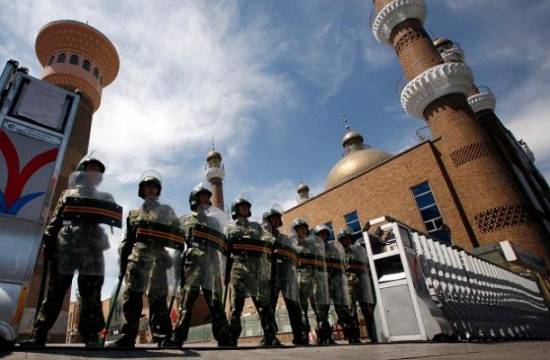Uyghur activists hope for genocide ruling as tribunal takes up China's actions in Xinjiang Featured
TAIPEI (Taiwan News) — Following efforts by the World Uyghur Congress, an independent investigation has been set up to investigate allegations that the Chinese government is committing genocide, and members of the largely Muslim ethnic minority hope an impartial judgment will raise the profile of their plight in Xinjiang.
The World Uyghur Congress has secured the services of prominent barrister Sir Geoffrey Nice, who announced the beginning of the Uyghur Tribunal on Sept. 3. Nice is known for his role as lead prosecutor in the war crimes trial of former Yugoslav leader Slobodan Milosevic, and he also presided over the independent China Tribunal, which ruled that Beijing was forcibly harvesting organs from practitioners of Falun Gong and other prisoners of conscience.
Currently, the International Criminal Court (ICC) is the only global authority with the power to prosecute those "charged with the gravest crimes of concern to the international community," namely crimes against humanity, war crimes, genocide, and aggression. But China is not a signatory to the Rome Statute, which established the court, and therefore its citizens are not subject to its jurisdiction.
Nevertheless, the activists hope the Uyghur Tribunal can accomplish the important step of pinning a name to the crime, which could further elevate their cause and convince sympathetic governments around the world to act more decisively in response.
Uyghur advocate Rahima Mahmut, whose efforts were critical to launching the tribunal, agreed to interview with Taiwan News. Musician, singer, translator, and interpreter, she is also the project director for the World Uyghur Congress' UK office.
Mahmut met Nice while both were involved in the China Tribunal, and she believes his strong background as a lawyer and researcher will be an asset when it comes to weighing the evidence. However, she noted that — even with evidence — it is difficult to prosecute until an independent, reputable body has defined a prosecutable offense in legal terms.
"We strongly believe that genocide is happening on every level," she said, adding that if the prosecution achieves its goal of defining what is going on in Xijiang, known to Uyghurs as East Turkestan, it would be "a useful tool to compel governments" to step up measures against Beijing.
Born in the north Xinjiang city of Ghalja of “Ghalja incident” fame, Mahmut has witnessed firsthand the Chinese Communist Party's (CCP) trademark way of dealing with dissent. She observed that before, crackdowns would occur intermittently and last several months.
Lately, she observed grimly, things have been different. "We didn't think this will last so long."
Over the past few years, the Chinese government has been targeting Uyghurs and other Muslim-majority minorities in the name of security. What has emerged is a pattern of ubiquitous surveillance, indoctrination, and depopulation.
Investigations and accounts of former detainees paint a picture of systematic repression in the region: people spirited off to camps where they face violence and degrading treatment; children torn from their families; women forcibly sterilized; Han Chinese men sent to share the beds of Uyghur women whose husbands are being "re-educated"; and "graduates" of the camps pressed into forced labor.
Even Uyghurs living abroad are not out of Beijing's reach. They report being harassed by CCP agents on social media, and the families of those who dare speak out are vulnerable to Beijing's reprisal.
While the pervasive fear for the safety of their loved ones is hard enough, members of the Uyghur diaspora must also contend with the state of uncertainty brought about by information blackout. Mahmut pointed out that it can take months for news of deaths — even those likely unrelated to the CCP's police state — to reach friends and family in the outside world.
Asked about international awareness of the goings-on in Xinjiang region, Mahmut cited progress, such as the rising amount of media coverage, people reaching out about what can be done, growing concern in Parliament, and the formation of groups such as the Inter-Parliamentary Alliance on China (IPAC). Nevertheless, "We still have a huge amount of work we have to do," she admitted.
Noting the economic sway Beijing holds over many countries, said that in the future she hopes to see more governments adopting legislation in the vein of the U.S.' Magnitsky-style sanctions and clamping down on Chinese apps like TikTok. She also called for a ban on products made from Uyghur "slave labor."
Every little bit helps, Mahmut said. "My people will suffer and die if no practical action is taken by free countries."
Additional Info
- عنوان تمهيدي: World Uyghur Congress' UK director says public awareness increasing but 'We still have a huge amount of work we have to do'


